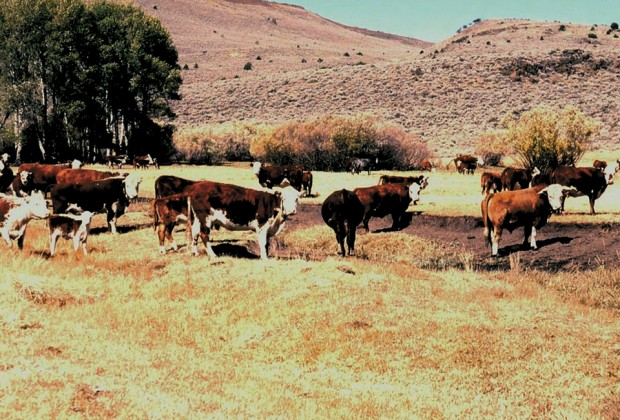OSU study urges massive grazing cuts.
gazettetimes.com; Bennett Hall
Cattle grazing at Eastern Oregon's Hart Mountain National Wildlife Refuge in 1989. A new study led by an Oregon State University researcher calls for sharp reductions of livestock grazing on federal lands throughout the West. (Photo courtesy of Oregon State University)Cattle and sheep should be barred from most public lands, OSU prof says:
Arguing that grazing is exacerbating the impacts of climate change, a study led by an Oregon State University researcher calls for drastically reducing or even eliminating livestock from federal lands in the West. The study, which appears today in the journal Environmental Management, builds on the work of other researchers from a wide range of disciplines. It was written by Robert Beschta, a professor emeritus in OSU's College of Forestry, and seven colleagues from the University of Wyoming, Geos Institute and other institutions. "This problem has been going on for decades and decades, and we're running out of time," said Beschta, who has spent the past 10 years studying the effects of grazing in the National Park System.
"Climate change is already under way in some places," he added. "If we ever want to improve or recover these ecosysems, we have to start now." While previous studies have been critical of the impacts of grazing on public lands, Beschta said, his is the first to consider how those may be compounded by global warming. He also took account of grazing by other hoofed mammals, or ungulates, such as feral horses and burros and wild deer and elk.
Titled "Adapting to Climate Change on Western Public Lands: Addressing the Ecological Effects of Domestic, Wild, and Feral Ungulates," the paper also calls for removing or reducing the numbers of feral horses and burros on Western public lands and controlling large herds of deer and elk, possibly by reintroducing wolves or other large predators.
The study warns of increased soil erosion, stream degradation, loss of habitat and other ecological damage on millions of acres of grassland, sagebrush steppe and riparian ecosystems throughout the West. With cattle, sheep and other livestock using more than 70 percent of U.S. Forest Service and Bureau of Land Management lands, the authors claim, grazing may be the biggest factor affecting wildlife in 11 Western states, including fish, birds, amphibians, small mammals and pollinators.
Beschta said he was driven to do the study by the recent push among federal agencies to improve resiliency on public lands, a policy discussion that was driven almost entirely by timber and wildfire issues.
"What was totally missing was improving the resiliency of rangeland watersheds," he said, "and they make up by far the majority of public lands in the American West."
A spokesman for a major livestock industry organization questioned the study's conclusions and rejected its recommendations. "Curtailing livestock grazing in the West would not solve the issue of increasing emissions of CO2," said Dustin Van Liew, director of federal lands for the National Cattlemen's Beef Association. In fact, he said, other research has shown that grazing actually encourages plant growth and strengthens root systems. He also suggested that grazing reduces wildfire risk by reducing fuel loads on rangeland.--George Wuerthner points out how innacurate this statement is based on how many fires have occurred on public lands that have been repeatedly grazed
"(Some) 7.2 million acres have burned in the West, and I would proffer that huge amounts of CO2 have been released into the atmosphere," Van Liew said.
Finally, he argued, banning grazing on federal lands would impose a tremendous hardship on ranchers and ranching communities."It would have huge impacts," Van Liew said. "Those operations provide the economic base for communities across the West."
Beschta acknowledged his policy recommendations would have economic consequences. But he said continuing to allow widespread grazing in the face of a looming climate crisis could be far more costly in terms of ecosystem services such as water for municipalities, agriculture and fish.
"We're not saying cows have to come off everywhere in the West, but we are saying they need to come off large areas," Beschta said. "It will be a huge challenge for the cattle industry, but these are public lands, and they have multiple values."
Subscribe via email to get updates
Wednesday, November 14, 2012
George Wuerthner commenting accurately about the adverse impacts of livestock grazing on our rangelands-----if a full accounting of the real "costs" of livestock production were ever assembled, you would find that livestock production makes no economic or ecological sense"............."The negative impacts include damage to riparian areas, competition for forage with native herbivores, wolf and other predator control, the poisoning of prairie dogs, the impacts on water quality, the degradation of watersheds, the dewatering of rivers for livestock forage production (hay) which of course harms fisheries, the spread of weeds induced by soil trampling, soil compaction that reduces water infiltration and the contribution to global GHG from methane release resulting from livestock production"..........Author of a recently released study on the impacts of Grazing, Oregon State Biologist Robert Beschta states: ":allowing widespread grazing in the face of a looming climate crisis will end up being very costly in terms of ecosystem services such as water for municipalities, agriculture and fish".............."We're not saying cows have to come off everywhere in the West, but we are saying they need to come off large areas"............ "It will be a huge challenge for the cattle industry, but these are public lands, and they have multiple values"
Subscribe to:
Post Comments (Atom)











No comments:
Post a Comment